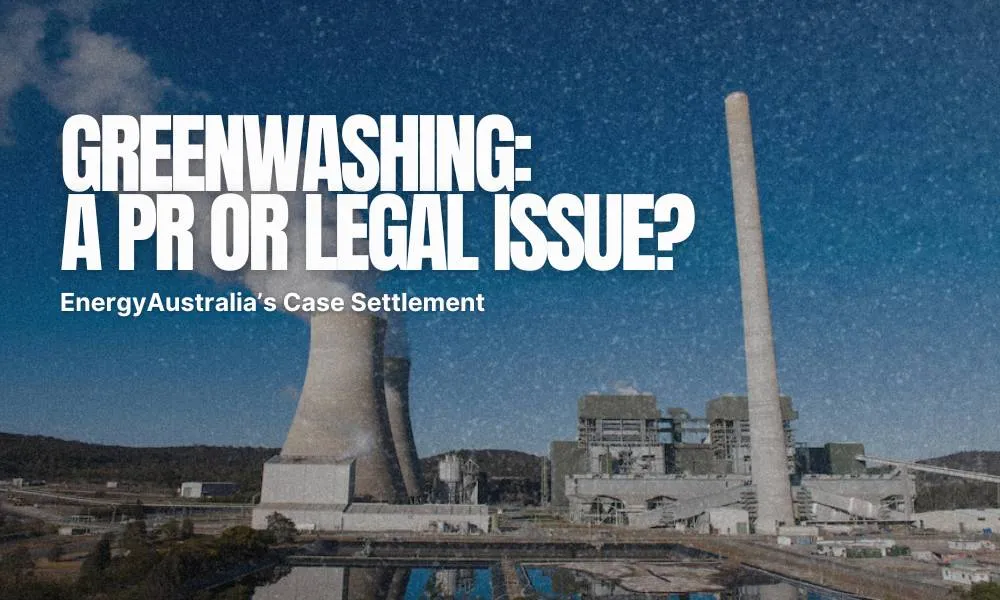PR or Legal Issue? EnergyAustralia’s Greenwashing Case Settlement

In a major development that’s sending ripples across Australia’s corporate and sustainability sectors, EnergyAustralia has admitted to misleading customers about its carbon offset program and settled a landmark greenwashing case.
This is more than a headline, it’s a warning. The legal action, brought by the advocacy group Parents for Climate, is the first successful greenwashing case against a major Australian energy provider. And it may signal the start of a broader reckoning around how climate claims are communicated.
So, what happened? And what does this mean for companies trying to demonstrate sustainability in good faith?
Let’s unpack the case, and the lessons every organisation should take from it.
What Went Wrong: Misleading Claims About “Going Neutral”
For years, EnergyAustralia promoted its “Go Neutral” program, claiming that customers could effectively offset the emissions from their electricity use through certified carbon credits. More than 400,000 Australians opted in, trusting that their choice was helping the planet.
But here’s what came out of the settlement: EnergyAustralia has now acknowledged that offsetting emissions does not undo or prevent the harm caused by burning fossil fuels. The company apologised to customers and admitted the marketing may have overstated the benefits.
“Carbon offsets do not prevent or undo the harms caused by burning fossil fuels.” — EnergyAustralia, in a public statement
This statement isn’t just a correction. It’s an industry-shaking admission that casts doubt over how environmental claims are packaged and sold, not only by EnergyAustralia, but potentially across the entire energy and corporate sector.
Why Greenwashing is Risky Business
Greenwashing, when a company presents its products or services as more environmentally friendly than they truly are, is no longer just a reputational risk. It now carries legal, financial, and regulatory consequences.
In this case, EnergyAustralia avoided court hearings by settling. But the fallout is real:
-
Loss of trust among 1.6 million customers
-
Public scrutiny over the effectiveness of offset programs
-
Regulatory questions about the government’s Climate Active certification scheme
-
An industry precedent for future lawsuits and investigations
Nic Seton, CEO of Parents for Climate, summed it up plainly:
“Greenwashing isn’t harmless. It’s costing families money, delaying climate action, and eroding trust.”
In other words, misleading climate claims don’t just hurt your brand, they hurt the climate movement and the broader public’s confidence in sustainable progress.
Carbon Offsets Are Not a Get-Out-of-Jail-Free Card
EnergyAustralia’s case puts a spotlight on a common pitfall: relying too heavily on carbon offsets as a climate strategy.
To be clear, not all offsets are bad. Some support valuable initiatives like reforestation or renewable energy. But they should never be a substitute for real, measurable emissions reductions.
EnergyAustralia itself has now acknowledged this:
“Offsetting is not the most effective way to assist customers to reduce their emissions… EnergyAustralia is now focused on direct emissions reductions.”
This shift reflects a growing sentiment in sustainability: offsets may play a role—but they’re not a solution on their own. And when used in marketing, their limitations must be crystal clear.
What This Means for Business: Lessons in Accountability
If you’re a sustainability leader, ESG consultant, or executive responsible for climate disclosures, this case offers a clear message:
Transparency is non-negotiable. Whether you’re reporting through Climate Active, disclosing under AASB S2, or marketing a net zero commitment—your claims must match reality.
Here’s what your organisation should do now:
-
Audit Your Claims: Review all public-facing materials related to climate, net zero, or environmental impact. Are your statements verifiable, recent, and aligned with current science?
-
Scrutinise Offsets: If your business uses carbon credits, be upfront about their source, impact, and limitations. Avoid language that suggests offsets erase emissions.
-
Prioritise Direct Action: Reduce your Scope 1, 2, and 3 emissions wherever possible—through operations, supply chain improvements, energy use, and material choices.
-
Document Everything: Governance, strategy, and oversight are under the microscope. Make sure roles, decisions, and responsibilities are recorded and defensible.
-
Upskill Your Teams: Climate literacy must extend beyond the sustainability department. Executives, marketers, and legal teams all need to understand the risks and responsibilities.
Where NetNada Comes In
At NetNada, we work with organisations to prevent exactly this kind of risk. Our tools help you:
-
Measure and reduce emissions with full transparency
-
Build clear governance structures to meet AASB S2 requirements
-
Conduct readiness assessments that surface gaps in your strategy and reporting
-
Communicate your impact without exaggeration, and back your claims with real data
We help businesses move from vague commitments to verifiable action, because that’s what compliance, customers, and climate now demand.
Final Thought: The Era of Unchecked Greenwashing is Over
This case sets a new benchmark for climate accountability in Australia. The days of glossy “green” messaging without substance are behind us, and not just because of shifting public expectations. Legal and regulatory frameworks are catching up, too.
For businesses, the path forward is clear: don’t oversell. Don’t delay. Don’t greenwash.
Instead, focus on real emissions reductions, build climate competence at every level, and partner with tools and experts that help you stay honest.
**Want to make sure your climate claims are defensible? **Reach out to NetNada to explore how we can support your emissions tracking and reporting with accuracy, transparency, and integrity.
Start Your Climate Reporting Journey
Join 1,000+ Australian businesses using NetNada for carbon accounting and sustainability reporting.